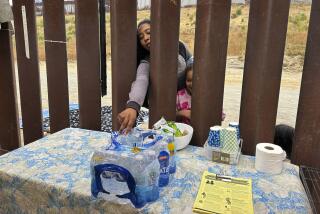Civil Wars Make Uncivil Wrongs
- Share via
Why has immigration become a global crisis with such suddenness? World population growth is undoubtedly one major factor. As countries exceed their carrying capacity, the choice for those at the very bottom may be emigration or starvation. Increasingly often, however, what drives people to flee is war.
This is the message in a global study of refugees just issued by Sadako Ogata, the U.N. high commissioner for refugees. The report says that worldwide one in every 125 people has been displaced by civil war or persecution. The 19.7 million refugees living in countries other than their own represent an 800% increase over two decades. And 24 million more are displaced within their own borders.
Much of this disruption is very recent. The just-released 1993 Freedom House survey reports an increase from 38 to 55 in the number of countries judged “not free.” This is the largest annual increase in the survey’s 20-year history, and it has much to do with the sudden acuteness of the immigration crisis.
The Western powers have been reluctant to address this crisis through international police action. Grimly, they also have been increasingly reluctant to grant asylum to those fleeing oppression and the deprivation of basic liberties.
A case in point is that reported on in The Times earlier this month by Ken Reich. A Muslim refugee from the Muslim-majority Sandzak region of Serbia, detained for seven months at the Terminal Island Detention Center of the Immigration and Naturalization Service, is about to be deported to Serbia. He fled eastward from Serbia when he was drafted by the Serbs to take part in the oppression of his own Muslim people in the Sandzak region, and he entered the United States, illegally, only after a long odyssey.
In this country, refugees from the ethnic wars of Yugoslavia are rare, but the case is otherwise representative. It is true that the West cannot solve all the problems of the world militarily. However, if it declines to solve any of them, it may seriously exacerbate the immigration problem that has suddenly grown so acute for it. Not every illegal immigrant is a refugee from war; but as the U.N. high commissioner on refugees has shown, many are--many more, perhaps, than even a wisely reformed and strictly enforced immigration policy can be expected to cope with.
More to Read
Sign up for Essential California
The most important California stories and recommendations in your inbox every morning.
You may occasionally receive promotional content from the Los Angeles Times.













